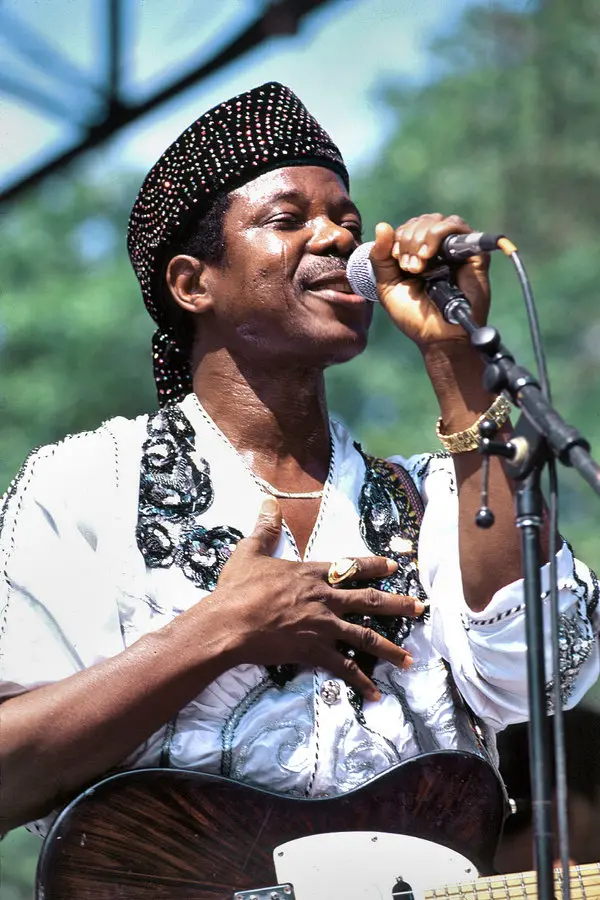Inspiring Creatives
King Sunny Ade: Evergreen Musician
‘Sunny Adé‘s stage show was characterized by top musicianship, highlighted by his guitar mastery, and dexterous dancing.’
Sunday Adeniyi Adegeye MFR (born 22 September 1946), known professionally as King Sunny Adé, is a Nigerian jùjú singer, songwriter, and multi-instrumentalist. He is regarded as one of the first African pop musicians to gain international success and has been called one of the most influential musicians of all time.
Sunny Adé made his entry into the Nigerian music space in 1967, with his African Beats. After achieving national success in Nigeria during the 1970s and founding his own independent label, Sunny Adé signed to Island Records in 1982 and achieved international success with the albums Juju Music (1982) and Synchro System (1983); the latter garnered him a Grammy nomination, a first for a Nigerian artist. His 1998 album Odu also garnered a Grammy nomination. Sunny Adé served as board chairman of the Musical Copyright Society of Nigeria before it got licensed and was later appointed honorary president of the society in recognition of his leadership role in the society.
Sunny Adé was born in Osogbo to a Nigerian royal family from Ondo and Akure. His father was a church organist, while his mother, Maria Adegeye, was a trader. As a member of the Adesida dynasty, his mother’s relatives included Oba Adesida I (who ruled Akure for 60 years).
Career
Sunny Adé left grammar school in Ondo City under the pretence of going to the University of Lagos. It was thus in Lagos that his eclectic musical career began.
His career began with Moses Olaiya‘s Federal Rhythm Dandies, a highlife band. He left to form a new band, The Green Spots, in 1967. Over the years, for various reasons ranging from changes in his music to business concerns, King Sunny Ade was influenced by Juju pioneer Tunde Nightingale and borrowed stylistic elements from his ‘So wambe’ style of juju.
Stage performances
After over a decade of resounding success in his native Nigeria, Sunny Adé received great acclaim in Europe and North America in 1982. The global release of Juju Music and its accompanying tour was “almost unanimously embraced by critics (if not consumers) everywhere”. Sunny Adé was described in The New York Times as “one of the world’s great band leaders”.. Sunny Adé‘s stage show was characterized by top musicianship, highlighted by his guitar mastery, and dexterous dancing. The live performances were also usually significantly longer than the two hours or less that had become the norm for concerts in North America and Europe…
A fusion of sound
Sunny Adé’s music is characterized by, among other instruments, the talking drum – an instrument indigenous to his Yoruba roots, the guitar and his peculiar application to jùjú music. His music is in the age-old tradition of singing poetic lyrics (ewi in Yoruba) and praise singing of dignitaries as well as components of Juju (traditional African belief) called the Ogede (casting of spells). Hence, Sunny Adé’s music constitutes a record of the oral tradition of his people for posterity.
Sunny Adé introduced the pedal steel guitar to Nigerian pop music. He introduced the use of synthesizers, clarinet, vibraphone, tenor guitar into the jùjú music repertoire such as dub and wah-wah guitar licks. Sunny Adé said he used these instruments not as an attempt to innovate, but as a substitute for traditional jùjú instruments which were too difficult to find and/or impractical for touring. The pedal steel guitar, for instance, was added to his repertoire as a sound-alike for an African violin.
Sunny Adé with his band invented his unique sound and instrumental which he mostly uses as an entrance song during live performances.
Island Record
After the death of Bob Marley, Island Records began looking for another third world artist to put on its contract, while Fela Kuti had just been signed by Arista Records. Producer Martin Meissonnier introduced King Sunny Adé to Chris Blackwell, leading to the release of Juju Music in 1982. Robert Palmer claims to have brought King Sunny Adé to Island’s attention, his familiarity being from his life on Malta in the 1960s listening to African Radio and Armed Forces Radio. Sunny Adé gained a wide following with this album and was soon billed as “the African Bob Marley”.
King Sunny Ade parted ways with Island records after the production of 1983’s Synchro System and 1984’s Aura.
Later career
In recent times, hip-hop music appears to be holding sway with the electronic media in Nigeria with massive airplay. Nonetheless, Sunny Adé’s musical output has continued to inspire a vast generation of other Nigerian musicians, who believe in the big band musical set up which Sunny Adé and late Fela Kuti are noted for. The musician Lagbaja is one of the many musicians whom Sunny Adé’s music has inspired. In 2008, his contributions to world music were recognized, as he was given an award for his outstanding contribution to world music at the International Reggae and World Music Awards held at the Apollo Theater in Harlem, New York.
.
Acting career
In the 1980s, Sunny Adé did some work in Hollywood. His music was featured in the 1983 film Breathless, starring Richard Gere, and the 1986 comedy One More Saturday Night, and he acted in Robert Altman‘s 1987 comedy O.C. and Stiggs. He featured in a few Nollywood movies in the early 2000s.
Awards
Sunny Adé has received numerous awards during his career. In November 2016 he became a recipient of the AFRIMA award. In December 2016 he was inducted into Hard Rock Cafe hall of fame. He was inducted into The Headies Hall of Fame at The Headies 2020 in February 2021.
To date, Sunny Ade is still soaring high like the eagle in the music space.
Story, abridged, sourced form Wikipedia



